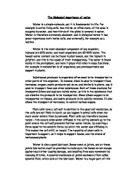The Biological Importance of Water
Water is the major constituent of living matter. From 50 to 90 percent of the weight of living organisms is water. Protoplasm, the basic material of living cells, consists of a solution in water of fats, carbohydrates, proteins, salts, and similar chemicals. Water acts as a solvent, transporting, combining, and chemically breaking down these substances. Blood in animals and sap in plants consist largely of water and serve to transport food and remove waste material. Water also plays a key role in the metabolic breakdown of such essential molecules as proteins and carbohydrates. This process, called hydrolysis, goes on continually in living cells.
A water molecule consists of an oxygen atom and two hydrogen atoms, which are attached at an angle of 105°. There are two pairs of electrons on the bottom that form a similar angle in a plane that is perpendicular. This asymmetrical arrangement accounts for the many unusual properties of water, such as the fact that it expands when it freezes. As water cools down towards its freezing point, the molecules slow down sufficiently for each one to form its maximum number of hydrogen bonds. To do this, the water molecules in liquid water must move further apart to give enough space for all 4 hydrogen bonds to fit into. As a result the water expands as it freezes, so the ice is less dense than liquid water and therefore floats on the surface. This is useful in the winter for marine animals, if a pond, lake or even the ocean freezes, the ice on top acts as an insulator keeping the water a temperature the animals can bare.







